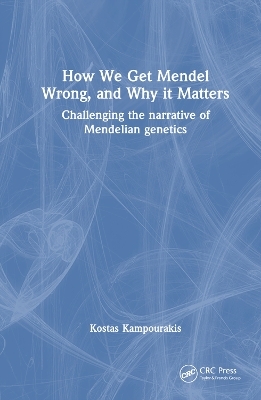
How we Get Mendel Wrong, and Why it Matters
CRC Press (Verlag)
978-1-032-45691-1 (ISBN)
Key Features
Corrects the distorting stereotypical representations of Mendelian genetics and provides an authentic picture of how science is done, focusing on Gregor Mendel and his actual contributions to science
Explains how the oversimplifications of Mendelian genetics were exploited by ideologues to provide the presumed “scientific” basis for eugenics
Proposes a shift in school education from teaching how the science of genetics is done using model systems to teaching the complexities of development through which heredity is materialized
Kostas Kampourakis is the author and editor of several books about evolution, genetics, philosophy, and history of science. He teaches biology and science education courses at the University of Geneva. He is the co-editor of Teaching Biology in Schools and What is Scientific Knowledge, both published by Routledge.
Preface: “Gregor Mendel, the first geneticist”. Part I Anachronistic Mendelism. Chapter 1 Mendel was not a geneticist ahead of his time. Chapter 2 Mendel was a brilliant experimentalist of his time. Chapter 3 Speculating about heredity. Chapter 4 The path to genetics. Chapter 5 The reification of the “lonely genius”. Part II Social Mendelism. Chapter 6 Mendel’s great defender. Chapter 7 Chromosomes, “factors” and genes. Chapter 8 “Mendelian” eugenics. Chapter 9 Geneticists’ attitudes towards “Mendelian” eugenics. Chapter 10 Mendelian genetics and the Nazi racial hygiene. Conclusions: Emending the teaching of school genetics.
| Erscheinungsdatum | 03.01.2024 |
|---|---|
| Zusatzinfo | 7 Tables, black and white; 5 Line drawings, color; 10 Line drawings, black and white; 5 Halftones, color; 42 Halftones, black and white; 10 Illustrations, color; 52 Illustrations, black and white |
| Verlagsort | London |
| Sprache | englisch |
| Maße | 156 x 234 mm |
| Gewicht | 576 g |
| Themenwelt | Naturwissenschaften ► Biologie ► Botanik |
| Naturwissenschaften ► Biologie ► Genetik / Molekularbiologie | |
| Weitere Fachgebiete ► Land- / Forstwirtschaft / Fischerei | |
| ISBN-10 | 1-032-45691-4 / 1032456914 |
| ISBN-13 | 978-1-032-45691-1 / 9781032456911 |
| Zustand | Neuware |
| Informationen gemäß Produktsicherheitsverordnung (GPSR) | |
| Haben Sie eine Frage zum Produkt? |
aus dem Bereich


